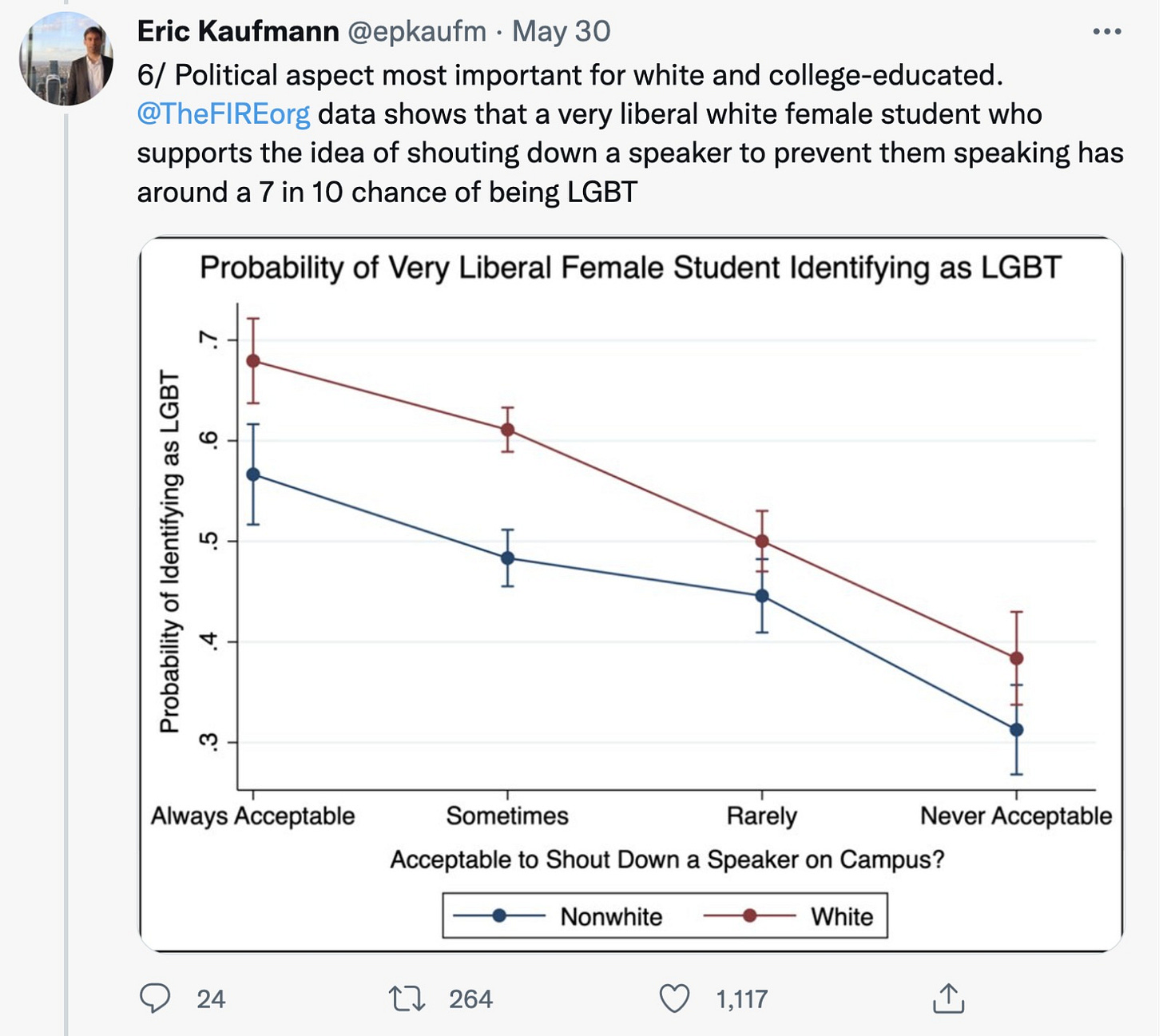Eric Kaufmann posted a great thread of rather incredible LGBT stats this week:
Here’s the one of the most mind-bending ones:
Anyway, I thought Prof Kaufmann’s neat collection of stats showing the influence of social trends would be a good excuse to write about rapid-onset gender dysphoria.
To be clear, this article does not refer to childhood-onset gender dysphoria, other than to note that the majority (60-90 per cent) of children with said condition become comfortable with their sex by adulthood and do not opt for a sex change. Instead, I want to look at what is known as rapid-onset gender dysphoria (ROGD). For those seeking a primer on transgenderism, I strongly recommend appendix two of Charles Murray’s Human Diversity (2020) from which I have sourced much of the following.
ROGD was a term coined by the physician and researcher Dr Lisa Littman of Brown University. It was the result of her systematic study—still the only one of its kind—of 256 surveys from parents who reported that their children had experienced rapid onsets of gender dysphoria. Dr Littman said she had noticed:
an unusual pattern whereby teens from the same friend group began announcing transgender identities on social media, one after the other, on a scale that greatly exceeded expected numbers.
It’s important to remember that these teenagers and young adults ‘had no history of gender dysphoria during their childhoods’.
Dr Littman, a physician trained in obstetrics, gynaecology, preventive medicine and public health, set out to examine the possibility that many of these cases were influenced by ‘peer contagion’, a neutral term for incidences where social networks influence our behaviour. Her results were disturbing. So much so that activists tried to get them erased from the journal in which she published them, PLOS ONE. Here are some of the highlights of what Dr Littman found:
None of the individuals in the study would have met the diagnostic criteria for gender dysphoria in childhood;
48 per cent had experienced a traumatic event prior to their ROGD;
63 per cent had one or more diagnoses of a psychiatric or neurodevelopmental disability;
67 per cent of the adolescents had one or more friends who declared they were transgender around the same time;
In 37 per cent of the friend groups described, the majority of individuals within the group became transgender-identified;
Coming out as LGBTIA increased popularity for individuals and 60 per cent of the friend groups mocked those not part of that community;
What’s more, 64 per cent of the parents had been called ‘transphobic’ or ‘bigoted’ by their children for one or more reasons, the most common being: disagreeing with the child about the child’s self-assessment of being transgender (51 per cent); recommending that the child take more time to figure out if their feelings of gender dysphoria persist or go away (45 per cent); expressing concerns for the child’s future if they take hormones and/or have surgery (40 per cent).
I urge you to read the full list.
Some final facts. ROGD primarily affects adolescent females, despite males historically having higher rates of gender dysphoria. The UK operated the largest child and adolescent gender services in the world (GIDS) and the sex ratio became increasingly disproportionate from 2010 (52 per cent female) to 2016 (72 per cent female). This is obviously commensurate with Dr Littman’s findings. She also notes the parents said the ‘clinicians they saw were only interested in fast-tracking gender-affirmation and transition and were resistant to even evaluating the child’s pre-existing and current mental health issues’.
ROGD is not yet recognised as a clinical diagnosis. In the next decade, expect to see many lawsuits, possibly suicides, from our society’s capitulation to misdirected compassion. If you find any of these facts disturbing, please share this article. It is only through arming ourselves with scientific literacy that we can protect young people.
If you liked this, please do subscribe. Maybe give it a share to spread the gospel of rationality. And if you want to support my work, you can do so with a paid Substack subscription or using the following methods:
https://www.patreon.com/Ideas_Sleep
BTC wallet address: 1KHB3Mq7njTGfquABcREsiywaxmDbP2NPY
And subscribe to my YouTube Channel here.












